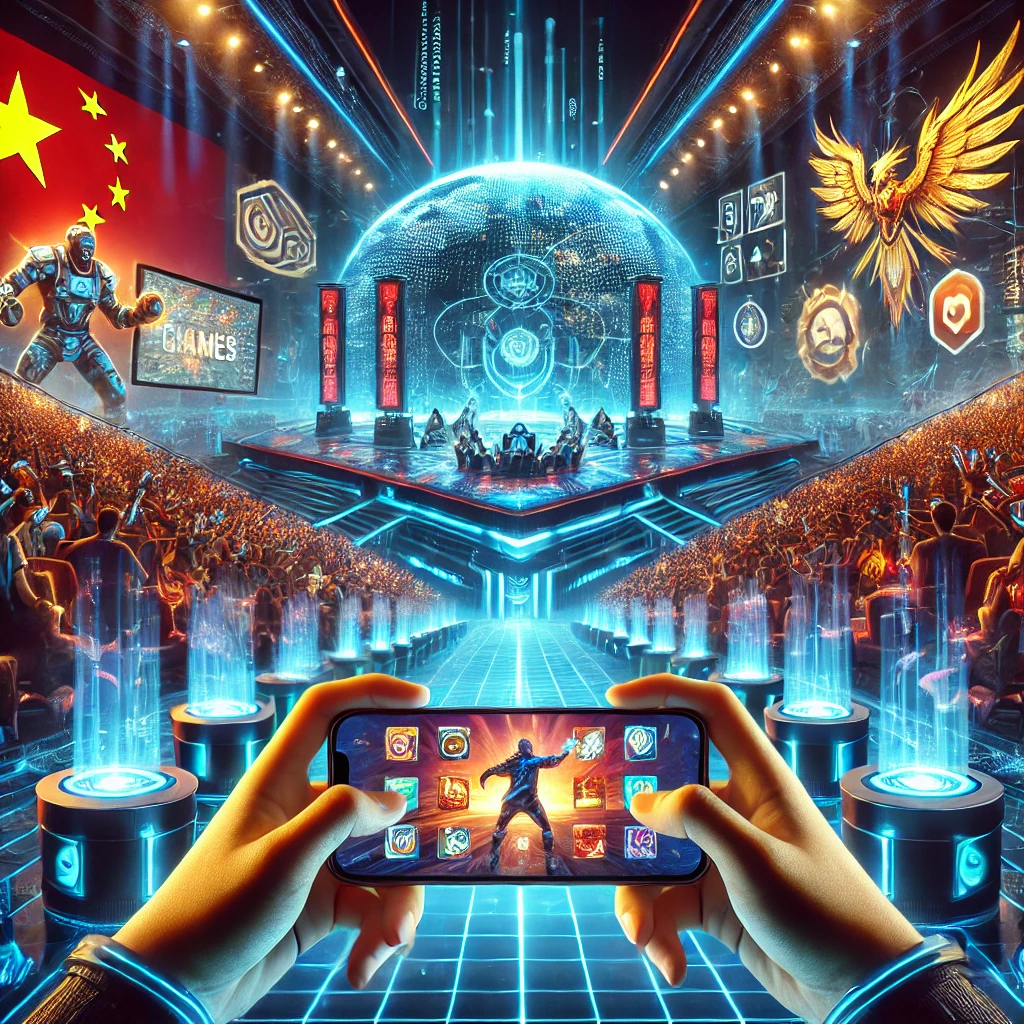Table of Contents
Introduction to China’s Video Game Landscape
Over the past two decades, China’s video game industry has witnessed a remarkable transformation, evolving into one of the largest markets for gaming globally. With a combination of socio-economic factors, technological advancements, and a cultural shift, video games have emerged as a mainstream form of entertainment in the country. The rapid ascent of the industry can be traced to the economic reforms initiated in the late 20th century, which encouraged private enterprise and attracted significant foreign investment.
As China’s middle class continues to expand, so too does the demand for diverse entertainment options, particularly among the younger demographic. This growing segment of the population has embraced video gaming not just as a pastime but as a social activity, fueling the rapid growth of both mobile and online gaming platforms. Mobile games, in particular, have surged in popularity, given the widespread penetration of smartphones and internet access. Tencent and NetEase, leading Chinese companies, have played pivotal roles in shaping the landscape, continually innovating and providing a variety of gaming experiences.
Technological influences have also been integral to the development of the video game industry. The integration of high-speed internet and advancements in gaming technology, such as virtual reality (VR) and augmented reality (AR), have allowed Chinese developers to create immersive gaming environments that attract both domestic and international gamers. Furthermore, esports have emerged as a significant sector within the industry, with China hosting numerous high-stakes tournaments that garner substantial viewership and sponsorships.
Through these shifts, video games have transcended their traditional boundaries, leading to the establishment of a vibrant ecosystem that includes game development, publishing, and event hosting, making China a formidable player in the global gaming narrative.

The Rise of Mobile Gaming
The mobile gaming sector in China has experienced explosive growth, positioning itself as a dominant player in the global video game industry. As of 2023, reports indicate that mobile gaming accounts for approximately 70% of the total gaming revenue in China, reflecting a significant shift away from traditional gaming platforms. The ease of access and convenience offered by mobile devices has played a pivotal role in this transformation, with affordable smartphones enabling a broader demographic to participate in gaming.
Leading the charge are major companies such as Tencent and NetEase, which have harnessed the potential of mobile gaming to develop some of the most popular titles in the country. Tencent’s Honor of Kings, for instance, not only became a cultural phenomenon but also broke records by achieving over 100 million daily active users. Similarly, NetEase has capitalized on mobile’s popularity through engaging multiplayer experiences and compelling narratives. These companies have adeptly adapted to the changing preferences of consumers, especially among younger demographics who favor mobile gaming over traditional PC and console experiences.
Consumer preferences are indeed shifting; younger players are drawn to the accessibility of mobile games that can be played anytime and anywhere. This demographic prioritizes games that offer social interaction, quick gameplay sessions, and unique competitive elements, all of which mobile gaming excels at delivering. Additionally, the integration of social media features and live-streaming capabilities has made mobile gaming more engaging, further bolstering its appeal. On the other hand, traditional gaming platforms are grappling with retaining their audience as they face challenges in innovation and engagement when compared to the dynamic mobile landscape.
Esports: A Cultural Phenomenon
The rise of esports in China has transformed what was once a niche interest into a significant cultural phenomenon, attracting millions of fans, gamers, and investors alike. Over the past decade, the esports landscape has flourished, with the country emerging as a dominant force within the global video game industry. Major tournaments, such as the League of Legends World Championship and Dota 2’s The International, have drawn unprecedented viewership both locally and internationally. These events not only showcase elite-level gameplay but also serve as social hubs for fans, turning esports into a celebrated component of Chinese popular culture.
The evolution of esports in China can be attributed to several factors. Government support has played a crucial role, with authorities recognizing the economic potential of esports. Initiatives aimed at developing the industry have encouraged local companies to invest in gaming infrastructure and talent development. Furthermore, the establishment of esports schools and training programs has nurtured a new generation of professional players, enabling them to hone their skills and compete on the world stage. As a result, Chinese teams have consistently performed well in international competitions, solidifying the country’s influence within the global esports ecosystem.
Key players and teams have risen to prominence, further solidifying China’s position in the esports world. Organizations like Invictus Gaming, FunPlus Phoenix, and EDward Gaming have become household names, representing China in various tournaments across multiple games. The achievements of these teams inspire aspiring players and enhance the visibility of esports as a legitimate career path. Prominent figures such as Faker and Doinb have also captivated audiences, bridging the gap between traditional sports fandom and the digital arena.
As esports continues to grow in popularity, it is evident that China will remain at the forefront of this cultural movement. The blending of competitive gameplay with entertainment is set to redefine the gaming landscape, encouraging a new wave of participation and investment in the esports sector. Through ongoing support and development, China’s influence on the global esports scene is poised to strengthen, paving the way for future innovations and achievements.
Regulation and Government Policies
The Chinese gaming industry operates under a complex framework of government regulations that profoundly influences its development. Central to this framework are laws pertaining to game approvals, content restrictions, and age regulations, which collectively serve to manage and control the gaming landscape within the country. The process for obtaining government approval for new video games is notably stringent, with developers required to navigate a lengthy submission process before a game can enter the market. This strict regulatory environment can significantly delay the release of new titles, affecting both local developers and international companies seeking to capitalize on the lucrative Chinese market.
Content restrictions in China are particularly rigorous, aimed at ensuring that games adhere to the government’s cultural and ethical standards. The authorities impose limitations on violence, gambling, and any content deemed inappropriate or politically sensitive. This has led many game developers to alter their original concepts to align with regulatory expectations. For foreign companies, this dynamic can complicate the localization of games, requiring a delicate balance between maintaining the game’s integrity and conforming to local regulations.
Moreover, age-specific regulations are crucial in shaping the gaming ecosystem. The Chinese government has implemented a restricted schedule on gaming hours for minors, aiming to combat gaming addiction. This policy impacts revenue generation for developers and game publishers, as it reduces the potential player base during peak hours. Consequently, both domestic and foreign enterprises must adapt their business strategies to align with these regulations, which directly influence marketing approaches and in-game monetization practices. Understanding these regulations is essential for any entity attempting to succeed in China’s rapidly evolving video game industry.
China’s Influence on Global Game Development
In recent years, China’s role in the global video game industry has evolved significantly, with Chinese companies transitioning from being primarily consumers to becoming substantial players in game development. This shift is largely attributed to aggressive investments in Western game studios, strategic acquisitions of intellectual properties, and collaborative projects that unite Eastern and Western gaming cultures.
Chinese gaming giants such as Tencent and NetEase have been at the forefront of this transformation. Tencent, for instance, has made substantial investments in popular Western game developers such as Epic Games and Activision Blizzard. By acquiring stakes in these companies, Tencent not only secures a foothold in the lucrative Western market but also gains access to advanced game development technologies and methodologies. Such investments are instrumental in fostering cross-cultural collaborations, enhancing the global reach of the games produced.

Moreover, the acquisition of intellectual properties has enabled Chinese companies to expand their portfolio of successful franchises. For instance, the purchase of the popular mobile game “Clash of Clans” by Miniclip showcases how Chinese investment can lead to the repurposing and localization of content tailored to the Chinese audience while still keeping original gameplay elements intact for international players. This dual approach benefits both the original creators and the expanding Chinese game market.
Another noteworthy aspect of China’s influence is the increasing occurrence of collaborative projects. These partnerships often result in games that amalgamate diverse gaming experiences, showcasing the unique artistic styles, narratives, and gameplay mechanics characteristic of both cultures. As both sides learn from one another, we see a new generation of hybrid games that not only resonate within Chinese markets but also appeal to global audiences, further solidifying China’s pivotal role in shaping the future of the gaming industry.
The Economic Impact of Gaming in China
The gaming industry in China has emerged as one of the most significant economic sectors, generating billions of dollars annually and boasting robust growth trajectories. As the world’s largest market for video games, China’s gaming revenue is projected to exceed $45 billion by 2023, reflecting an impressive increase compared to previous years. This substantial financial influx highlights not only the popularity of video games but also their pivotal role in fueling economic growth.
Beyond direct revenue generation, the gaming industry in China has catalyzed job creation across several sectors. It is responsible for the employment of millions, encompassing a diverse range of roles from game development and design to marketing and community management. Furthermore, ancillary industries, including hardware manufacturing, e-sports event management, and retail, have flourished alongside the growing demand for gaming products and services.
The contribution of the gaming industry to China’s gross domestic product (GDP) is noteworthy. With the exponential rise in the gaming population—which now includes over 600 million active gamers—revenues generated from video games have increasingly accounted for a significant share of the nation’s economy. Moreover, the industry has encouraged advancements in technology, as companies continually invest in innovation to enhance user experience, making strides in fields such as virtual reality and artificial intelligence.
The effects of the gaming industry extend into broader economic benefits, including tourism. E-sports tournaments and gaming conventions draw millions of attendees, contributing to local businesses and enhancing cultural exchanges. As the industry continues to evolve, it brings forth new opportunities, solidifying China’s position as a leader in the global gaming arena. These interconnections between the gaming sector and the wider economy underscore the importance of video games as a driving force for sustainable growth in China.
Challenges Facing the Industry
The Chinese video game industry, despite its rapid growth and significant market share globally, encounters a myriad of challenges that threaten its sustainability and expansion. One of the most pressing issues is market saturation. As the number of game titles proliferates, developers and publishers face increasing difficulty in capturing the attention of consumers. This oversaturation not only diminishes the chances of new games succeeding but also contributes to declining overall revenue and player engagement in the long term.
Intense competition further complicates the landscape. With a multitude of domestic and international players vying for market share, companies must continuously innovate and adapt their offerings to retain and attract players. The competition is not solely about the games themselves but also encompasses marketing strategies and distribution methods. The ability to leverage social media, streaming platforms, and influencer collaborations can often dictate a game’s commercial success.
Regulatory hurdles present another significant challenge for the industry. The Chinese government has instituted various policies controlling the release and monetization of video games, including long approval timelines and stringent content restrictions. Such regulations can delay product launches and restrict creative expression, which may deter companies from entering the Chinese market or developing innovative titles tailored to local preferences.
Additionally, the implementation of anti-addiction measures aimed at younger players poses a unique challenge. These measures, designed to promote healthy gaming habits, limit the amount of time minors can spend playing games. As a result, companies are compelled to formulate new strategies to engage this demographic without violating governmental guidelines. To navigate these challenges, many companies are investing in market research, diversifying their product offerings, and focusing on user experience to enhance player retention and satisfaction.
Cultural Export and Global Trends
In recent years, China’s video game industry has positioned itself as a significant cultural exporter within the global marketplace. The rapid growth and sophistication of the sector can be attributed not only to the increasing number of gamers domestically but also to the intent of developers to create games that resonate with both local and international audiences. This duality is evident in how local themes and storytelling practices are integrated into the games while maintaining a universal appeal.
Chinese developers often draw upon rich cultural elements ranging from traditional mythology to contemporary societal issues, weaving them into immersive narratives that engage players. Games like “Genshin Impact,” for instance, exemplify this trend, featuring a beautifully crafted world inspired by Chinese landscapes and folklore, yet it resonates with a diverse global player base. By employing familiar gameplay mechanics and art styles that appeal to Western gamers, developers successfully bridge cultural gaps, allowing players around the world to experience Chinese elements without feeling alienated.
Moreover, the adaptability of Chinese games to global trends is crucial in this cultural exchange. Aspects such as multiplayer functionality, competitive gaming, and real-time interaction have become essential components in appealing to international markets. The rise of esports in China is a testament to this adaptability, exhibiting how local competitive gaming scenes are not just inward-looking but are also gaining traction globally. Chinese teams and tournaments are now feeding into an expansive esports ecosystem that attracts a worldwide audience, making it an integral facet of cultural exportation.
As the industry evolves, the delicate balance of maintaining cultural authenticity while appealing to global sensibilities will continue to define China’s role in the video game sector. This ongoing adaptation underscores the country’s influence on global gaming trends and exemplifies how cultural narratives can travel well beyond their original borders.
Future Outlook for China’s Gaming Industry
The future of China’s gaming industry appears poised for significant evolution, driven by both technological advancements and shifts in consumer preferences. One of the most notable trends is the rising adoption of virtual reality (VR) and augmented reality (AR) technologies. These immersive experiences are not just enhancing gameplay but are also redefining the social interactions within gaming environments. As hardware becomes more accessible and software innovations continue, the integration of VR and AR could attract new audiences and create fresh revenue streams for developers.
Cloud gaming is another sector projected to experience substantial growth in China. With an increasing number of users accessing games through mobile devices, coupled with advancements in internet infrastructure, the ability to stream high-quality games without the need for powerful consoles or PCs will likely reshape the gaming landscape. Major companies are investing in this technology, and as it becomes more mainstream, consumers will benefit from reduced costs and greater convenience, thereby increasing overall engagement in the gaming world.

A notable shift in consumer behavior is also on the horizon, especially with the younger generation, who are often more inclined to seek social and community-driven experiences in gaming. This demographic prioritizes interactive and collaborative gameplay, which may result in an uptick in multiplayer and social games. Understanding these preferences will be crucial for game developers aiming to succeed in this competitive market.
As China’s gaming industry evolves, the implications for the global gaming sector are profound. With its vast market and innovative approaches, China’s developments will likely influence global trends, including game design, monetization strategies, and the overall user experience. The interplay between local and international gaming practices will shape not just China’s future, but potentially the global gaming ecosystem as a whole, paving the path for a reinvigorated approach to gaming on a worldwide scale.





